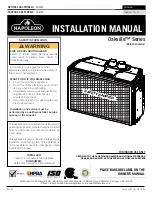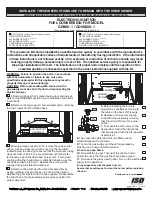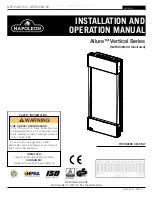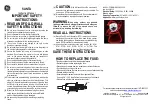
Outdoor Sensor - PSSENS01
1
Sensor Enclosure
(2) Plastic Anchors
Seal Gasket
Front Cover
(2) Mounting
Screws
Fig. 1: Sensor Enclosure and Components
Mounting the Outdoor Sensor
1. Remove the front cover and mounting screws /
anchors from the sensor enclosure.
2. When mounting the enclosure, the exterior wall
selected should represent the heat load of the
building. Typically a northern or northeastern
wall will suit most buildings. A southern facing
wall for those buildings, which may have large
glass walls or windows on the southern face.
3. Ensure the sensor enclosure is shielded from
direct sunlight or the effects of heat or cold
from other sources (exhaust fans, appliance
vents...) to prevent false temperature sensing.
4. Mount the sensor enclosure at an elevation on
the exterior wall to prevent accidental damage
or tampering.
5. Avoid mounting the enclosure in areas subject-
ed to excessive moisture.
6. Once an area on the exterior wall has been
determined, to affix the enclosure use the enclo-
sure as a template to mark the location of the
mounting screws.
7. Using a 3/16” drill bit, drill 2 pilot holes on the
marked locations.
8. Tap the enclosed plastic anchors into the pilot
holes. Use care not to damage the anchors.
9. Mount the sensor enclosure using the screws
provided.
Wiring the Sensor
1. Remove the sealing nut and sealing gasket from
the sensor enclosure.
2. Route 18 AWG 2-wire cable or similar wire
cable through the sealing nut and gasket.
Connect the wire ends to the sensor terminals 1
and 2.
2a. Cut a small slit in the seal gasket and route 18
AWG 2-wire cable or similar wire cable
through the seal gasket into the enclosure.
3. Re-insert the sealing gasket and tighten the seal-
ing nut to the sensor enclosure.
4. Route the sensor cable back to the appliance,
ensuring the cable is not route parallel to tele-
phone or power cables.
If the sensor cable is located in an area with
sources of potential electromagnetic interfer-
ence (EMI) the sensor cable should be shield-
ed or the wires should be routed in a ground-
ed metal conduit. If using shielded cable the
shield wire should be connected to the com-
mon ground of the unit.
5. Connect the sensor cable to the outdoor sensor
terminals on the 24V terminal strip located
inside the appliance enclosure (see appliance
wiring diagram).
NOTICE


























